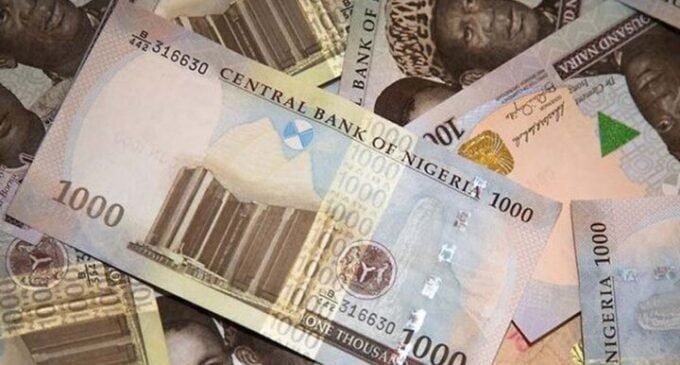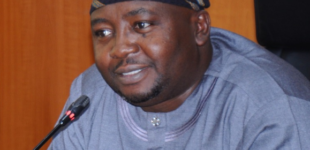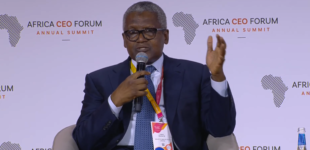Nigeria’s currency redesign: Cashless policy, and the poor unbanked

Recently, the Central Bank of Nigeria (CBN) announced that it has concluded arrangements to redesign some of the country’s currency’s denominations (₦200, ₦500, ₦1000 notes). The apex bank said by 15 December 2022 when the new notes will be rolled out, these currencies will be wearing new looks and will run side-by-side with the old notes as legal tenders until 31 January 2023. It’s generated mixed reactions across the nation, as expected.
The apex bank advanced several reasons as to why it is embarking on the exercise. It said, among other things, it envisages that the proposed redesign would have significant effects on efforts to tackle insecurity, as it would dislocate the ecosystem of financial transactions in the kingdom of kidnappers because, according to Emefiele, about 80% of the currency in circulation is outside the banking system – a factor that eases the payment of ransom to kidnappers, and terrorists in particular, as demanded by those social malcontents. He also said it will render very difficult, if not impossible, the venture of vote-buying during the forthcoming general election that is almost on us. As it is customary of those vote-buying politicians, loads of cash would have been stacked in their various homes, in anticipation of the general election. So, the apex Bank governor believes redesigning the currency, which will necessitate the return of the old ones by holders to the bank in exchange for new ones, will give the managers of the country’s currency and economy the firm grip they need on the Naira, for effective management.
He also went further to advance one of the most basic explanation of the causes of inflation as a major reason for the move – there is too much money in circulation, chasing too few goods. “More specifically, as at the end of September 2022, available data at the CBN indicate that ₦2.73 trillion, out of the ₦3.23 trillion currency in circulation was outside the vaults of commercial banks across the country, and supposedly held by members of the public,” Emefiele told newsmen. This translates to the fact that, 84.5% of the total amount in circulation is not within the range of the “Cash Management” system put in place in our monetary ecosystem. But Emefiele believes that once the money is returned to the CBN’s vault, through commercial banks, the “physical” measure would be most effective in controlling the rising prices of commodities in Nigeria. He also believes that redesigning the currency will help drive the much heralded cashless economy, and it would be complemented by the increased minting of the ẹ-Naira. I shall be back on this, shortly.
Moreover, among the reasons was the need to safeguard the integrity of the Naira
According to him, advancement in printing technology has massively aided counterfeiting of the Naira, but that, once the redesigned notes are out, it would strengthen the integrity of the currency, by rendering the counterfeits useless.
Many Nigerians have hailed the move, and agree with the CBN Governor’s position, especially on the need to curb inflation, render cash in the hands of insurgent unusable, undermine counterfeited ones, and prevent vote-buying. An aggregation of these, it is also believed, would shore up the value of the Naira against the Dollar.
But, while the Minister for Finance, Budget and National Planning, Mrs. Zainab Ahmed agrees with most of the reasons advanced by Emefiele, she based her reservation on the fact that, consultations were not wide enough to discuss the pros and cons of the move. She alleged that she (her Ministry) was not carried along, even though, the Permanent Secretary, Ministry of Finance – one of her subordinates, is a member of the CBN Board where such an issue must have been discussed to the minutest of details before the policy statement was issued. It is, therefore, expected that the Minister would, or should, have been briefed by her Ministry’s representative on the CBN board. That (lack of operational synergy among sister agencies) under the Buhari administration, is never unheard of. The presidency, however, punctured the Minister’s claim that consultations were not wide enough, saying it was aware, and its approval was sought and duly gotten by the CBN. After all, the CBN Governor, in line with the provisions of the CBN Act, reports, directly, and rigidly so, to the president. That however does not reduce the importance of the salient points raised by the minister, that there would be adverse effects on the economy, both at the macro and micro levels, hence, the need to discuss, how those effects would be mitigated.
Some people said it is ill-timed, and that, poor Nigerians would be at the receiving end of the effects, while the rich, who are purportedly, the main targets would go unhurt. Someone like the Edo State Governor, Godwin Obaseki said, it is not in good faith, as he sees it as a ploy by the ruling All Progressives Congress (APC) to deny other politicians, on the platform of other parties, access to funds, to prosecute electioneering projects, considering how heavily monetised the country’s electoral process is. According to him, it is now only the APC politicians, aided by power of incumbency, who would have access to the physical cash to prosecute the election. But according to the CBN Governor, the exercise is long overdue. He stated that it ought to have taken place, about a decade ago.
The CBN governor’s intention to drive the Cashless economy with redesigning the currency, has been emblematic of the federal government’s penchant for policy somersault in recent years. When the idea of the policy was first conceived, it was meant to help reduce the cost of (physical) cash management, the basis for multiple charges on depositors accounts. The policy therefore encourages Nigerians to go electronic in their financial transactions. It was even backed-up with the massive roll-out of POS across the country. But despite the fact that Nigerians are gradually taking to “to the Cashless Economy” through electronic transactions, it’s been business as usual. Apart from the introduction of stamp duty of at least, ₦50 per electronic transaction by the federal government, the manner, and frequency of charges by the banks had almost quadrupled. A friend of mine once jocularly said, his bank (name withheld) can charge you for anything and send such a ridiculous message as, “Dear customer, ₦50 has been deducted from your account, to move Nigeria forward”, to justify it. Funny! But jokes apart, imagine being charged every month for the maintenance of an “ATM” (debit) card – something you have not even applied for the ATM card, let alone, having collected and used it. For every electronic transfer of funds now, the customer is charged ₦50, in addition to their normal ₦10, ₦25, and other inexplicable fees. Imagine a bank sending customers unsolicited birthday SMS, and then turn around, to charge them for it at the end of the month. Little wonder, Nigerian banks, despite their blatant refusal to finance Micro, Small and Medium Scale Enterprises, MSMEs (which drive every nation’s economy) regularly declare pre-tax quarterly profits running into hundreds of billions of Naira. You’d begin to wonder, how do they come about such humongous amounts of profit, when the real sector of the economy remains recessive and unfinanced? The reason is not far-fetched. Constant and unabated pilfering of customers fund, deposited with them, provide the largest chunk of the profit. Just imagine, if a bank wakes up on a weekend and removes ₦50, as they normally do, from each of their millions of customers… The amount is minute, right? Yes, it is. But come to think of it; if a bank does it to about three million of their customers, with a ridiculous dose of certainty that, over 90% of them would not bother to call for explanations, as to what the charges represent, and why? Assuming they do that, once or twice a week, multiplied by 52 (in a year), consider how much that translates to. Funnily enough, this does not even include situations when a huge chunk of customers’ funds would just develop wing and fly out of their accounts, and the bank would be feigning ignorance, trying to put the blame on the customer, without making efforts to mandate their fraud prevention/detection unit to carry out some investigation with a view to unraveling the mysterious disappearance of depositors’ funds. It is only in Nigeria that, savings account holders, who had applied, neither for an overdraft, nor a loan, would have negative balances recorded in their accounts. There was a recent report that, eleven banks charged their customers, about seven hundred and fourteen billion, sixty-one million Naira (₦714.61 Billion) for electronic fees and other forms of commissions in the first nine months of 2022. Meanwhile, interest rates on money deposited with them are not commensurate with what they cream-off customers’ accounts.
So, as the currency redesign, aimed at driving a Cashless Economy looms, who protects the poor from having their hard-earned saving in their bank accounts rummaged and pilfered? The concern, as to who protects the poor, becomes more grave because there is little or no “customercentrism” in the country’s financial sector. In a saner clime, every bank would be mandated to open a toll-free channel to interface with customers who have one complaint or two, for effective and efficient service delivery and customer protection. But there is nothing like that. The few of them that manage to provide one would keep customers waiting for hours, listening to auto-responses, after when they would drop the call.
So, who protects the poor unlettered Nigerians who are still being convinced to embrace the banking system? I mean the unbanked and the under-banked, who legitimately earn their income, but do not buy the idea of saving, due to the not-so-transparent conducts of most of Nigerian commercial banks that are characterised by fraudulent deductions from customers’ deposits. What happens, if those categories of customers fail to be convinced to take their old currencies to the bank in exchange for the new ones on time?
Abubakar writes from Ilorin. He can be reached via 08051388285 or [email protected]
Views expressed by contributors are strictly personal and not of TheCable.














There are no comments at the moment, do you want to add one?
Write a comment